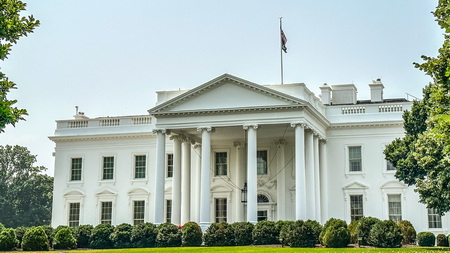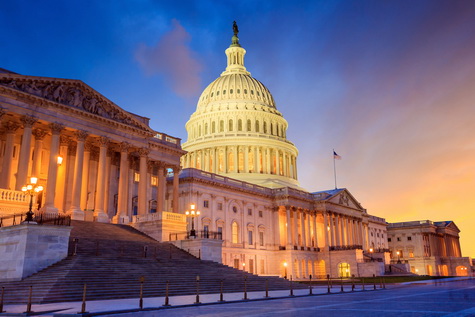
The Biden administration is considering increasing the corporate tax rate and the individual rate for high earners as it deliberates how to structure its next major legislative initiative – a sprawling “Build Back Better” economic growth package that may cost far more than the $1.9 trillion coronavirus-relief bill enacted last week. (BGov, March 15 and Roundtable Weekly, March 12)
Why It Matters:
- The first major tax increase since 1993 could be proposed as one method of funding Biden’s ambitious infrastructure plan. Heather Boushey, a member of the White House Council of Economic Advisers stated, “There is a long list of things that we need to invest in,” including “broadly defined” infrastructure, the power grid, and a plan to bolster child and elder care. (BGov and Bloomberg Television interview, March 15)
- Biden’s tax plan would aim to provide relief for middle-class households, including those in the $110,000-a-year income range, according to Bharat Ramamurti, deputy director of the White House National Economic Council. “The key here is that the president believes strongly that the biggest corporations and those folks who have done extremely well over the last several decades should pay a bit more,” Ramamurti said. (Bloomberg Television interview, March 16)
- Senate Minority Leader Mitch McConnell (R-KY) this week rejected any potential tax increases to fund President’s Biden infrastructure plan. (The Hill, March 16)
- Democrats are considering using the budget reconciliation process to pass an infrastructure bill, the same process used to pass the pandemic relief bill in the Senate by a simple majority in the 50-50 Senate. Under normal budget rules, the support of at least 10 GOP senators would be needed to defeat a 60-vote filibuster. Democrats will only be able to use reconciliation for one more bill this year. (The Hill, March 15)
- The enormous scope of the administration’s legislative goals may lead to the possible separation of their economic growth package into as many as three bills. (Politico Playbook, March 18)
Congressional Legislation:
- Expanding allowable investment opportunities for REITs could increase private sector infrastructure and help revitalize distressed retail businesses. The Roundtable-supported, bipartisan Retail Revitalization Actof 2021 (H.R. 840) – introduced Feb. 4 by House Ways and Means Members Brad Schneider (D-IL) and Darin Lahood (R- IL) – would modernize real estate investment trust tax provisions to permit REITs to invest equity in struggling commercial tenants that have been harmed by the COVID-19 pandemic. (News release, Feb. 4)
- H.R. 840 is the focus of a March 16 Tax Notes article entitled, “Modifying REIT Rules Could Aid Recovery and Infrastructure Plans.”
- House Energy and Commerce (E&C) Committee Chairman Frank Pallone, Jr. (D-NJ) has scheduled a March 22 hearing on the committee’s recently released Leading Infrastructure For Tomorrow’s (LIFT) America Act, which would provide more than $312 billion in funding for broad range of projects. (E&C news release, March 11 and Chairman’s Memorandum, March 18)
- House E&C Committee Republicans released a clean energy and climate package this week in response to the E&C Democrats’ LIFT legislation. (E&C Republicans news release, March 15)
- Sen. Elizabeth Warren (D-MA) and Rep. Alexandria Ocasio-Cortez (D-NY) on March 18 introduced the BUILD GREEN Infrastructure and Jobs Act, a $500 billion proposal to shift U.S. transportation away from fossil fuels by 2050.
What’s Next:
- More legislation is expected to be introduced that will focus on highways, mass transit and other surface transportation, as well as tax-related energy and infrastructure measures. House bills are expected from Transportation and Infrastructure Committee Chairman Peter DeFazio (D-OR) and Ways and Means Committee Chairman Richard Neal (D-MA).
- A “by-the-mile” vehicle usage tax is also under consideration to fund transportation infrastructure projects. Transportation Secretary Pete Buttigieg is considering funding highway projects with a fee based on how many miles someone travels instead of how much gasoline they pump. Buttigieg has stated the administration will move swiftly to reauthorize the surface transportation highway bill, which is set to expire at the end of September. (BGov, March 15)
- The Roundtable is part of the Build by the 4th coalition, led by the U.S. Chamber of Commerce, which encourages the Biden Administration and the new Congress to pass a comprehensive infrastructure deal by Independence Day 2021.
Infrastructure investment will be a focus of discussion between commercial real estate leaders and policymakers during The Spring Roundtable Meeting on April 20 in Washington, DC.
# # #









